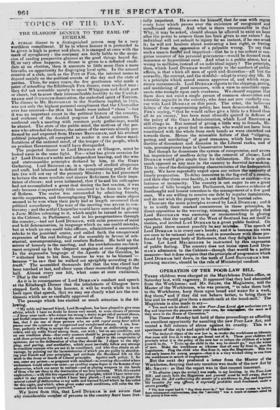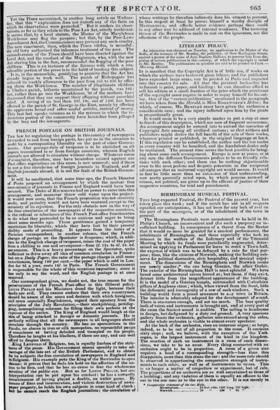OPERATION OF THE POOR-LAW BILL.
THREE children were charged at the Marylebone Police-office, on Saturday last, with vagrancy. It appeared that they had absconded from the Workhouse; and Mr. Snurr, the Magistrate, told the Master of the Workhouse, who was present. "to take them back to the Workhouse, keep them upon bread and water for a week, flog them,* and if they did not behave better, to bring them to him and he would give them a month each at the tread-mill." The Magistrate is also made to say- " You need not be afraid : the new Poor-Law Local atel authorizes you to flog and imprison the paupers under your care, for toiecoadooe, the same as if they were in the House of Correction."
The Times of Monday laid hold of these proceedings as affording an excellent opportunity for assailing the new Poor-Law Act, and vented a full column of abuse against its cruelty. This is a specimen of the style and spirit of the article- " The declared object of the new law is, to render the workhouse so irksome, that none will live in it who can get bread out of it. These poor children did precisely what it is the policy of the new law to induce the children of a larger growth to do. " Trails up the child in the way lie should go," says the wisest of men. Make the workhouse so irksome that all may fly from it, says the Legislature. Flog the child who flies from it, says the Magistrate. This ism tine early lesson for young paupers—that it is a very wicked thing to run from the workhouse in search of employment." But the next day produced a letter from the Master of the Workhouse, deny ing that any mention was made of the new Act by Mr.. SHUTT: so that the report was in that respect incorrect. " No allusion (says the writer) was made, in my hearing, to the Poor-Law Bill: and surely both the Magistrate and yourself must be well aware1 that so for from the Act authorizing the master of a workhouse to _flog and unpriscus the lunatics for any offence, it expressly prohibits such treatment, under a severe penalty." • The first report had it '' Hog them severely :" but there seems reason. to believe. from subsequent explanations, that the "severely" was • touch of rhetoric added by the penny sline-Inao. Yet the Times maintained, in another long article on Wednes- day, that this " explanation does not disturb any of the facts on which its observations were grounded." But it renders its obser- vations, as far as they relate to the Poor-Law Act, utterly irrelevant.' It seems that, by a local statute, the Master of the Marylebone Workhouse may flog the paupers; but that, by the Poor-Laws Amendment Act, the Commissioners may prevent any such cruelty. The new enactment, then, which the Times vilifies, is merciful : the del laws authorized the inhuman treatment of the poor. The animadversion of the Times should have been directed against the Local Act, and the conduct of the Magistrate, who, with the new Act staring him in the face, recommended the flogging of the poor children. This is an instance of the fairness with which a con- siderable portion of the press is in the habit of treating this subject. It is, in the meanwhile, gratifying to perceive that the Act has already begun to work well. The parish of Bishopsgate has reduced its weekly allowance to the poor from 55/. to 33/. by offer- ing them the Workhouse. The number of illegitimate children in Chelsea parish, hitherto maintained by the parish, was 102; but, rather than go into the Workhouse, 96 of the mothers have discovered that they can support their offspring without parochial relief. A saving of no less than 99/. 10s. out of 149/. has been effected in the parish of St. George-in-the-East, merely by offering the applicants bread and other useful articles, instead of money. This last fact speaks volumes as to the manner in which the in- dustrious portion of the community have heretofore been pillaged by the lazy and the intemperate.

















 Previous page
Previous page